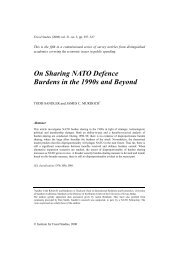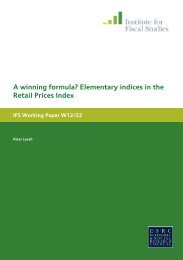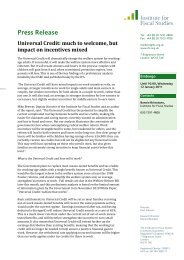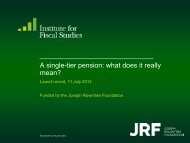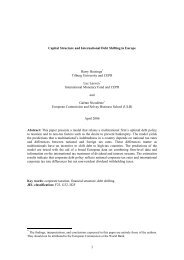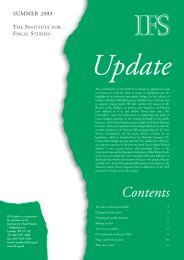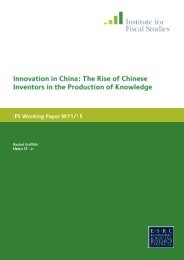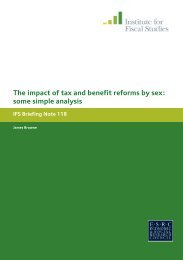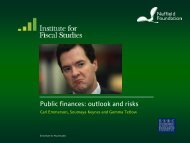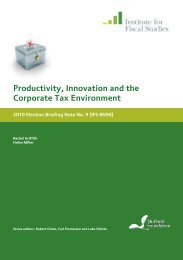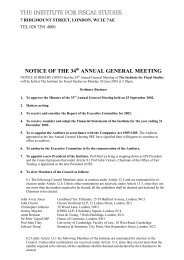A single-tier pension: what does it really mean? - The Institute For ...
A single-tier pension: what does it really mean? - The Institute For ...
A single-tier pension: what does it really mean? - The Institute For ...
You also want an ePaper? Increase the reach of your titles
YUMPU automatically turns print PDFs into web optimized ePapers that Google loves.
A <strong>single</strong>-<strong>tier</strong> <strong>pension</strong>: <strong>what</strong> <strong>does</strong> <strong>it</strong> <strong>really</strong> <strong>mean</strong>?<br />
3.2 Ending derived and inher<strong>it</strong>ed <strong>pension</strong>s<br />
<strong>The</strong> <strong>single</strong>-<strong>tier</strong> <strong>pension</strong> will provide more extensive cred<strong>it</strong>ing of unpaid activ<strong>it</strong>ies<br />
than the current system, particularly for periods of unpaid activ<strong>it</strong>y that occurred<br />
before 2002. This should therefore reduce substantially the number of people<br />
who have very low state <strong>pension</strong> ent<strong>it</strong>lements in their own right.<br />
A further component of the proposed <strong>single</strong>-<strong>tier</strong> <strong>pension</strong> is, therefore, to end the<br />
current system of derived and inher<strong>it</strong>ed rights. <strong>For</strong> those reaching SPA after<br />
2016, <strong>it</strong> will no longer be possible to accrue <strong>pension</strong> ent<strong>it</strong>lement based on one’s<br />
spouse’s contributions. 30 This creates a potential group of losers who would have<br />
received a ‘Category B’ <strong>pension</strong> based on their spouse’s contributions, but who<br />
now will receive e<strong>it</strong>her much less or nothing based on their own contributions.<br />
<strong>The</strong> number of individuals who are affected by this who have always lived in the<br />
UK should be vanishingly small, as generous cred<strong>it</strong>ing arrangements and<br />
increasing labour-force attachment of women <strong>mean</strong> that more people are<br />
accruing <strong>pension</strong>s in their own right. However, for those outside the UK who do<br />
not earn qualifying years in their own right, this policy represents a significant<br />
long-term reduction in the potential <strong>pension</strong> ent<strong>it</strong>lement they can accrue.<br />
3.3 Ending contracting out<br />
Under the current <strong>pension</strong> system, individuals w<strong>it</strong>h occupational defined benef<strong>it</strong><br />
<strong>pension</strong>s can contract out of S2P. <strong>The</strong> Pensions Bill 2013–14 sets out legislation<br />
to abolish this abil<strong>it</strong>y to contract out, <strong>mean</strong>ing that all employees w<strong>it</strong>h one job<br />
earning the same amount in a given year will pay the same NI contributions and<br />
accrue the same state <strong>pension</strong> ent<strong>it</strong>lement.<br />
<strong>The</strong> immediate implication of this is that individuals who would have contracted<br />
out of S2P will accrue greater state <strong>pension</strong> ent<strong>it</strong>lement for each year of activ<strong>it</strong>y<br />
under the proposed system than they would under the current system but they<br />
and their employers would also pay higher NI contributions.<br />
Incorporating historic contracted-out ent<strong>it</strong>lements into the new <strong>single</strong>-<strong>tier</strong><br />
<strong>pension</strong> was an important challenge for the government in designing the <strong>single</strong><strong>tier</strong><br />
policy. In the next section, we describe how this will be dealt w<strong>it</strong>h and <strong>what</strong><br />
the implications are for the different treatment of those who did and did not<br />
contract out in the past.<br />
30<br />
<strong>The</strong>re will be some protection for the group of women who were paying the married woman’s<br />
reduced rate in 1981.<br />
18



